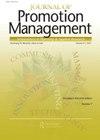Using Funny Memes for Social Media Marketing: The Moderating Role of Bandwagon Cues
Q2 Business, Management and Accounting
引用次数: 3
Abstract
Abstract This study involved a 2 (image type: funny meme vs. serious image) × 2 (level of bandwagon cues: high vs. low) between-subjects online experiment (N = 258). Statistical results showed that using Internet memes was more effective than using serious images in the setting of brand-related Twitter posts. Specifically, when this study’s participants perceived the deployed meme to be humorous, they evidenced positive attitudes toward the post and greater intention to share the post on social media. Furthermore, bandwagon cues were found to moderate the meme effect on persuasion through perceived humor. Participants’ humor perception was enhanced when exposed to a meme post featuring a large number of replies, retweets, and likes (i.e., a high level of bandwagon cues). An unexpected outcome that emerged from the data was that funny memes had a negative impact on brand recall through humor perception. This study’s exploration of funny memes as humor stimuli within the context of social media adds to the literature on humor communications in marketing, as well as illustrates the importance of bandwagon effects for humor persuasion.在社交媒体营销中使用有趣的表情包:从众线索的调节作用
本研究采用2(图像类型:搞笑模因vs严肃模因)× 2(从众线索水平:高vs低)的被试在线实验(N = 258)。统计结果显示,在品牌相关推文的设置中,使用网络表情包比使用严肃图片更有效。具体来说,当这项研究的参与者认为所部署的模因是幽默的,他们对帖子表现出积极的态度,并且更愿意在社交媒体上分享帖子。此外,从众线索通过感知幽默调节了说服的模因效应。当参与者接触到具有大量回复、转发和点赞(即高水平的潮流线索)的表情包时,他们的幽默感知得到了增强。从数据中得出的一个意想不到的结果是,有趣的表情包通过幽默感知对品牌回忆产生了负面影响。本研究对社交媒体背景下搞笑模因作为幽默刺激的探索,增加了营销中幽默传播的文献,也说明了从众效应对幽默说服的重要性。
本文章由计算机程序翻译,如有差异,请以英文原文为准。
求助全文
约1分钟内获得全文
求助全文
来源期刊

Journal of Promotion Management
Business, Management and Accounting-Marketing
CiteScore
6.10
自引率
0.00%
发文量
26
期刊介绍:
The Journal of Promotion Management will keep you up-to-date on applied research and planning in promotion management. It is designed for practitioners in advertising, public relations, and personal selling, as well as academicians, researchers, and teachers in these areas. Every year, businesses in the United States budget approximately two-thirds of all marketing money into consumer and trade promotions designed to push products through the distribution chain. Any successful brand marketing plan relies on promotion, whether to stimulate immediate sales or ensure continued commerce.
 求助内容:
求助内容: 应助结果提醒方式:
应助结果提醒方式:


